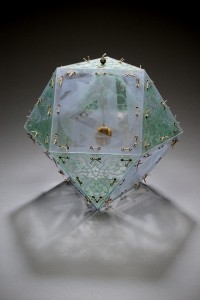The bridge collapsed, the car fell in the river, the mother unfastened her seat belt and clambered into the backseat to free her five- and three-year-old, and the father rolled down the windows, but a bus slammed on top of the car and crushed the roof. The car filled with water, sank away from the bus, and glided to the silt. The parents gathered their children and each other in their arms, and one by one, eyes wide in the murk, the family breathed, the mother last of all.
***
Waking up was weird. She felt light: limbs, organs, breath, pulse almost nonexistent, like memories after too many drinks. She was floating, but not in water or air. Her senses were empty: no sight, sound, touch, taste, or smell. She seemed to be nothing but thought.
This was a relief, as if she’d coughed out a smothering fullness in the lungs and started from the grim end of an inconsistent dream.
***
The pleasure of silence, stillness, and solitude wore off. She felt alone. The loneliness threatened to drown her.
There was someone nearby. A voice: “We can see you now. Keep going.” A touch: on her wrist. “I can feel you now. Try seeing.” Light, shadow, shapes, colors—blurry like through a wet windshield. “Your eyes are open. Now breathe.”
Her lungs—the idea of lungs—opened out. Smells, tastes, the sense of life poured through her mouth and nose. She remembered all, and a shuddering, sobbing blackness took her.
***
“It’s hard,” said the voice—an old woman dressed like an eighty-year-old from ten years before.
The mother looked past the old woman to the fields and trees around her. Everything was beautiful and clean and a little too close to her preferences.
“How long was I hysterical?” she asked.
“I wouldn’t know how long. Time doesn’t chop into bits here. I had a lot of different thoughts about a lot of different things while you fuzzed out.”
“Fuzzed out?”
“Smudged. Swooned. Blanked out. Melted. Phased. Shifted. Deshaped. Dissolved. Diffused. Disintegrated. Pick a synonym. You’ll see when our next tragic arrives.”
“How often do tragics arrive?”
“Too often, poor things. But you mean when will you see one. Too soon. I can’t give you a figure. It’s not like clockwork. It happens when it happens. We seem to be dealing with a new one most of the time. It takes a while for them to adjust. Sometimes there are batches.”
Batches. The others must have survived somehow. She almost fuzzed out again.
***
It maddened her that there was no objective way to tell time. There was a sun in the sky, but it was always where she happened to expect it to be, and there was no night. With effort, she could make a sunrise or sunset, but these were effects only she could see unless she convinced the old woman to share the events with her. Even then, when they compared descriptions, it was plain they were not seeing the same display. Colors, shapes, and locations were always a little bit off. This principle extended to the flora and other elements of the landscape. Representations adjusted as they pointed things out to each other, but each began with her own set of images with their own content.
***
After what must have been days, the mother asked, “Why are there only two of us here?”
The old woman smiled. “There are thousands. You just haven’t been ready to see them.”
“I’m ready now. Where are they?”
“Here, there, and everywhere.”
“When can I see them?”
“They are in plain sight for those who have eyes to see, and in plain hearing for those who have ears to hear.”
“Why are you talking like that? Where are the people?”
“You will see them when your eyes are opened.”
The mother scanned every corner of the meadow she was picturing. She saw nothing but grass and flowers at first, with trees in arcs and circles on the slopes above, beside, and below her. She closed her eyes and tried to be open to seeing, then looked again. Now she saw blurs and shimmers, some near, some far. She repeated the process and began to see faces and physiques, still blurry and featureless, like shadows in frosted glass, but human and individual, many acting in ways incongruent with the environment, responding to their own visions.
“Do you see them now?” asked the old woman.
“Almost. They are unformed.”
“Because you have not met them. When you touch and hear them, you will see them, but not as they are: as they think they are.”
“Will that change?”
“When they change. Most of us see ourselves as we were at death. I walked around in my nightgown for what must have been years.”
“How do I present?”
“As you see yourself. A woman in her early thirties, dripping wet. You drowned, I presume.”
“Yes. With my family: husband, two little ones. Where are they? Are they here? We should have come in the same batch. Unless they survived. We were in our car, at the bottom of the river. We all breathed in. I saw them all breathe in. Where are they?”
“Were you sealed?”
“Sealed?”
“You’ll understand when you get to that lesson.”
“Why can’t I go to them, find them?”
“Look as far as you can. What do you see?”
“An ocean.”
“I see a wall. It surrounds us. My wall and your ocean are the same thing: a barrier we can never pass without submission and sealing. I’m still working on submission. When I succeed, I will go to my family, but there is one I will never see again, one to whom I could never be sealed. I will miss her forever.”
The mother looked down at the ocean, shifting and blue—and vast. She felt a tear, or the idea of a tear, but whether of sorrow or rage, she couldn’t yet tell.
